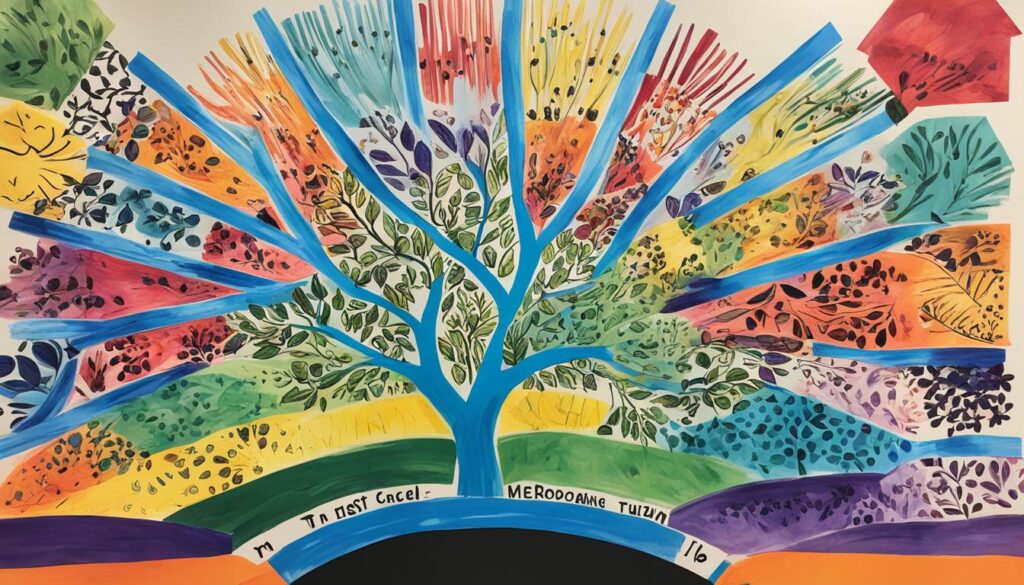“Although the world is full of suffering, it is also full of the overcoming of it.” – Helen Keller. Embarking on the path to addiction and trauma recovery is a journey of transformation and resilience. Mapping out this uncharted territory requires not only immense courage but also an informed approach that acknowledges the intertwined nature of addiction and trauma. In navigating this complex terrain, you may uncover a path marked by holistic healing, where every step forward is a testament to your strength and determination.
As you delve into the subject of addiction and trauma recovery, it is vital to consider the multifaceted relationship between past experiences and current struggles. Echoing the sentiments of Helen Keller, recovery can become an attainable goal, emerging from the shadows of adversity into a beacon of hope. We invite you to explore this profound journey, where each milestone is both a conquest over past afflictions and a cornerstone for a renewed sense of self.
Understanding the connection between trauma and addiction is essential for anyone seeking to heal. By examining the mechanisms that bond these afflictions, crafting a comprehensive recovery plan becomes an organic process. Harmonizing the science of detoxification with the art of building resilience, addiction and trauma recovery demands an empathetic and evidence-based strategy—one that treats the whole person, not just the symptoms.
Key Takeaways
- Recognize the intricate bond between trauma and substance addiction as a basis for healing.
- Embrace the significance of adopting a holistic and trauma-informed recovery strategy.
- Consider the impact of both addiction and trauma for sustainable and comprehensive recovery.
- Value the importance of personalizing recovery paths to meet your own unique needs and circumstances.
- Acknowledge the role of a supportive community and the reinforcement of social ties as pillars in recovery.
In your healing journey, you’ll transform. To begin, understand that addiction and trauma recovery is a journey best navigated with a clear understanding of its depth and breadth.
Understanding the Link Between Trauma and Addiction
Exploring trauma and addiction recovery shows how closely they are linked. This connection forms the basis of a person’s path to healing. Realizing how trauma and addiction relate is key to starting a focused addiction and trauma recovery integration model.
Understanding this relationship shines a light on the huge effect past trauma has on current behaviors and addictions. It shows that many struggling with addiction also face past traumas. This leads them to use substances as a way to cope, although it’s harmful.
Explaining the Relationship: Insights from ISTSS
The International Society for Traumatic Stress Studies (ISTSS) points out the link between trauma and substance abuse isn’t random. They offer thorough research that traumatic events often push people toward addictive behaviors as a form of escape, even though it’s destructive.
The Underlying Cycle: Trauma Leading to Substance Use
The trauma model of addiction explains a harsh cycle. Survivors of trauma may use drugs or alcohol to ease their pain and memories. But this dependence on substances only worsens addiction, leading to more trauma as it affects relationships, jobs, and health.
Co-Occurring Disorders: PTSD and Depression alongside Addiction
Often, addiction comes with other mental health issues like PTSD and depression. This makes recovery even harder. Therefore, it’s essential to have an addiction and trauma recovery integration model. This approach treats both the addiction and the mental health issues together.
Personal Experiences: Navigating the Neuroscience of Recovery
The journey to beat addiction and trauma is filled with stories of courage and determination. These stories from Idaho Falls are not only uplifting but also highlight the importance of new treatments in recovery. Understanding these personal experiences shows the powerful effect of mixing neuroscience with holistic healing.

Shannon Delaney’s Story of Overcoming MS through IFS Therapy and Somatic Practices
Shannon Delaney’s fight against multiple sclerosis is a success story of using Internal Family Systems (IFS) therapy and somatic exercises. These methods, rooted in the science of healing, were crucial in her recovery from addiction and trauma in Idaho Falls. Her dedication to therapy helped her make peace with herself, creating a healing space.
Somatic practices made her feel more connected to her body, helping her integrate different parts of herself.
Embracing Self Leadership and Wisdom for Healing
In Idaho Falls, winning against addiction and trauma often involves the wisdom to lead oneself towards recovery. By taking charge of their own recovery, people effectively rewire their brains. Self-guidance brings about real, lasting change.
| Therapy Technique | Description | Impact on Recovery |
|---|---|---|
| Internal Family Systems (IFS) | A psychotherapeutic model focusing on the internal “family” of sub-personalities or parts. | Facilitates self-awareness and reconciliation of inner parts, crucial for healing the wounds of trauma. |
| Somatic Practices | Body-centered therapies that focus on the connection between mind and physical sensations. | Grounds therapeutic processes, aids in releasing stored trauma in the body, and promotes somatic mindfulness. |
Addiction and Trauma Recovery: The Five Pillars Approach
Starting your healing journey from addiction and trauma is a big step. It needs a well-rounded approach that looks after your mind and body. At Harmony Ridge Recovery Center, they’ve developed the five pillars approach. This isn’t just a path to getting sober. It’s a life-changing journey aimed at building strength and lasting wellness.
Harmony Ridge Recovery Center’s Holistic Framework
When you start the recovery process at Harmony Ridge Recovery Center, you dive into a mix of five key areas. These areas work together, not alone, to help you recover for good. You’ll learn five important skills for staying healthy and avoiding relapse.

| Five Pillars | Components | Benefits |
|---|---|---|
| Trauma-Informed Therapy | Psychotherapy, EMDR, Somatic Experiencing | Addresses root causes of addiction, fosters emotional understanding |
| Addiction Treatment and Detoxification | Medically supervised withdrawal, inpatient care | Ensures safety during detox, sets foundation for recovery |
| Cognitive Restructuring and Coping Skills | CBT, DBT, stress management techniques | Creates new thought patterns, equips with coping strategies |
| Social Support and Community Engagement | Support groups, family therapy | Builds a support network, enhances social well-being |
| Mind-Body Healing and Self-Care | Yoga, meditation, balanced nutrition | Promotes overall health, teaches self-care practices |
Using these pillars in your daily life means more than just attending sessions or following a schedule. It’s about making deep, personal changes that look at the whole you. This shift fixes the past and clears a path for a future without addiction or trauma. Harmony Ridge Recovery Center invites you to start this detailed, caring, and whole-person recovery process. They’ll help you stay strong and confident as you move forward.
The Role of Trauma-Informed Therapy in Recovery
Effective addiction therapy needs understanding and compassion. It’s about knowing how past hurts deeply affect individuals. Trauma-informed care is crucial here. It cares for the unique needs of those hurt by trauma. This method supports healing by creating a safe space for growth.

In trauma-informed therapy, you explore how your experiences link to substance abuse. It helps you see how trauma influences your life. Getting this insight is key to finding ways to cope better.
Trauma counseling adapts to fit each person’s story. It’s designed to build strength and fight addiction’s pull. The main aim is helping you take back control of your life. This shows how powerful and life-changing this therapy can be.
This type of care focuses on healing and growth. It aims to improve both your mind and spirit. This proves the power of trauma-informed care in addiction therapy. It also highlights its role in improving mental health overall.
Comprehensive Addiction Treatment and Detoxification
Recovery from addiction isn’t easy, but there is hope with evidence-based treatment. It’s important to know that treating addiction involves many approaches. These methods tackle addiction’s complex nature effectively.
Medically Supervised Detox and Cognitive-Behavioral Therapy
Detox is the first step in recovery. It involves medical help to safely stop using addictive substances. This phase keeps you safe and reduces withdrawal discomfort. It prepares you for the next steps in treatment.
Cognitive-Behavioral Therapy (CBT) is key in treating addiction. It helps you see and change harmful thought patterns and behaviors. With CBT, you learn better ways to deal with life’s challenges.
Dialectical Behavior Therapy: Integrating Mindfulness and Regulation
Dialectical Behavior Therapy (DBT) combines mindfulness with emotional control. DBT teaches skills to handle stress, resist sudden urges, and fix relationships. These skills are crucial for a successful recovery.
Motivational Interviewing and Family Therapy Dynamics
Motivational Interviewing (MI) and family therapy are also important. MI is a counseling style that boosts your desire to change. Family therapy helps fix problems with loved ones that addiction can cause. Healing with your family supports your recovery.
| Therapy Type | Focus | Benefits |
|---|---|---|
| Medically Supervised Detox | Safe withdrawal from substances | Reduces risks associated with cessation; sets stage for therapy |
| Cognitive-Behavioral Therapy | Identification and modification of behaviors and thought processes | Increases coping strategies; reduces relapse risks |
| Dialectical Behavior Therapy | Integration of mindfulness; emotional and social regulation | Enhances life skills; supports sobriety and interpersonal relationships |
| Motivational Interviewing | Strengthening commitment to change | Boosts self-efficacy; aligns goals with actions |
| Family Therapy | Healing family dynamics affected by addiction | Promotes system-wide recovery; improves support networks |
Choosing evidence-based treatment shows you’re ready for a change. With support, a life without addiction is possible. Remember, treatment and detox are just the start. Staying committed is essential for long-lasting recovery.
Building Cognitive Restructuring and Coping Skills
Starting a healing journey is more than changing habits. Cognitive restructuring plays a key role. It means reshaping harmful thoughts, crucial in beating addiction and handling stress better. Learning new coping skills helps you deal with present issues and prepares you for future challenges.

Practicing mindfulness increases your awareness. You see things clearly, not through the lens of past hurts. Combined with stress management, mindfulness is key to lasting recovery. It helps you stay calm and tackle life’s ups and downs.
Identifying Negative Thought Patterns and Emotional Triggers
Identifying what causes distress is the first step in cognitive restructuring. It involves examining how thoughts, feelings, and actions interact, leading to dependency. Understanding these connections can lead to significant, lasting change.
The Development of Mindfulness and Stress Management Techniques
Mindfulness means being fully present in each moment. It’s a critical part of overcoming addiction. When paired with stress management techniques, it cuts through the noise of cravings and turmoil. This brings peace and clear thinking.
| Cognitive Skill | Technique | Application in Recovery |
|---|---|---|
| Self-awareness | Mindfulness Meditation | Heightens presence and focus; reduces impulsivity |
| Emotional Regulation | Breathwork Practices | Calms the nervous system; manages acute stress |
| Response Flexibility | Cognitive Behavioral Techniques | Encourages adaptable thinking; changes behavioral responses |
| Resilience | Visualization and Affirmation | Builds confidence; inspires positive future outcomes |
With consistent practice, negative thoughts and triggers weaken. They’re replaced by strength and calmness. This journey doesn’t just lead to recovery. It also gives you a new sense of purpose and well-being.
Emphasizing Social Support and Community Engagement
Being active in a supportive community is key for recovery. Rehabilitation for veterans focuses on mental health support. This helps build a sense of friendship which is vital for healing from addiction and trauma.
Fostering Camaraderie: The Experience in Rehab for Veterans
In veteran rehab programs, making connections is crucial. Everyone is part of a supportive environment. This creates a bond based on shared experiences, which helps build resilience.
Overcoming Isolation through Group Therapy and Veteran Support
Isolation can hinder recovery significantly. Group therapy offers a way to connect with others. It provides a space for sharing and reduces loneliness, boosting mental health support networks for recovery.
| Benefits of Group Therapy | Impact on Veterans |
|---|---|
| Enhanced Communication Skills | Facilitates Community Reintegration |
| Emotional Support from Peers | Alleviates Feelings of Isolation |
| Exposure to Diverse Perspectives | Widens Understanding of Personal Struggles |
| Accountability and Shared Learning | Promotes Personal Responsibility |
Group therapy and veteran programs offer strength and unity. They acknowledge the unique challenges of veterans, leading to meaningful healing and mental health.
Integrating Mind-Body Healing and Self-Care into Recovery
Taking a holistic approach to recovery can change your path to wellness. It looks at more than just traditional therapies. It includes many practices that help both your body and mind feel better. By using methods that support mind-body healing and self-care, your healing can be deeper and last longer.
The Importance of Holistic Therapies and Nutritional Restoration
Getting the right nutrition is very important when you’re recovering. Using holistic therapies with a good diet helps you heal better. This approach boosts your body’s strength and improves your mind and emotions, leading to long-term recovery.
Let’s look at how holistic therapies help in recovery. The table below shows some common practices and their benefits:
| Therapy | Primary Benefit | Supports Recovery By |
|---|---|---|
| Yoga | Stress Management | Enhancing mind-body connection, improving mood and anxiety management |
| Meditation | Mental Clarity | Increasing focus and mindfulness, reducing relapse probability |
| Acupuncture | Pain Relief | Managing withdrawal symptoms, reducing need for pharmaceutical interventions |
| Equine Therapy | Emotional Awareness | Building confidence and promoting emotional healing |
| Nutritional Counseling | Physical Restoration | Correcting deficiencies, boosting overall health and vitality |
Physical Wellness, Stress Reduction, and Sleep Hygiene
Activities like regular exercise help reduce stress and make you feel happier. Combine this with good sleep routines to help your recovery. This creates an environment that helps you recover strongly.
Here are the parts of a good self-care routine that supports recovery:
- Physical Activity: Invigorates the body, improves mood, and decreases stress levels.
- Stress Reduction Techniques: Using mindfulness, breathing exercises, and muscle relaxation helps reduce daily stress.
- Sleep Hygiene: Keeping a regular sleep schedule and a comfy place to sleep are key for health.
By adopting a holistic approach, you’re using many strategies to improve your recovery. Mind-body healing and self-care are great tools for getting better. Your journey to health is always moving forward. Adding these practices into your life often can help a lot on your healing journey.
Addiction and Trauma Recovery: Tailoring Treatment to Individual Needs
Every person’s journey toward healing is different. This is why addiction and trauma recovery centers must offer personalized care. A plan that looks at both the challenges and strengths of each individual is crucial.
Adapting Therapeutic Interventions for Effective Support
Since everyone’s experience with trauma and substance abuse is unique, therapy must be adaptable. This ensures that treatment fits the patient’s specific needs. It could be one-on-one counseling, group therapy, or trauma-focused sessions.
Healing Both Conditions Concurrently for Sustainable Recovery
Dealing with both trauma and addiction together requires an integrated approach. Treating them separately might not lead to the best results. A comprehensive plan considers how trauma and addiction affect each other. This aims for lasting recovery.
Conclusion
The journey to healing from addiction and trauma isn’t one you have to do alone. Getting help from addiction and trauma recovery services is key. They understand how trauma and addiction are connected. This means they can help you with both issues at the same time.
Choosing to get help is a big step towards getting your life back. These services offer many kinds of support. They mix care that knows how trauma affects you with the best ways to treat addiction. This helps you heal in every way – your body, mind, and spirit.
Every step forward shows how strong you are. The right treatment and your own strength will light the way to a better life. It’s a life not held back by your past. Look for addiction and trauma recovery services that fit your own story of healing. They can help you find hope and many new chances for the future.




